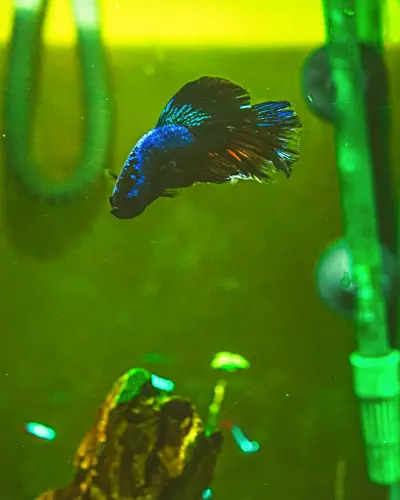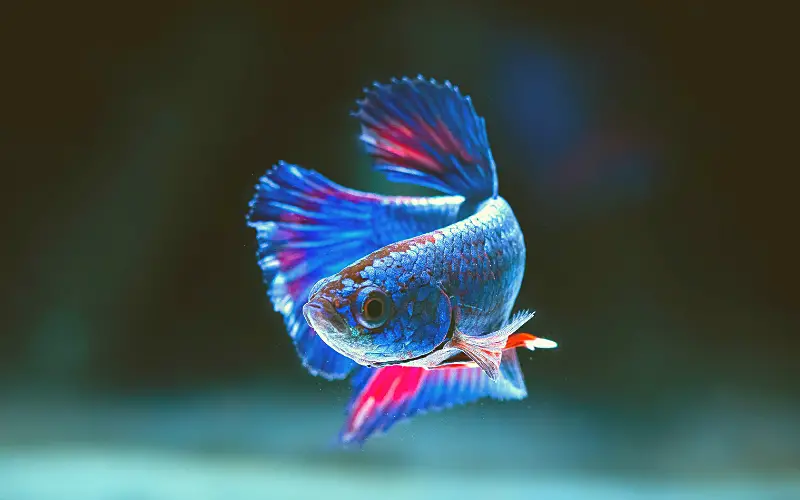Is my filter too strong for my betta? Proper filtration is crucial for providing a healthy and comfortable environment for your betta fish. However, the water current can sometimes be too strong for your betta to handle. This can lead to various issues and negatively impact the well-being of your beloved fish. How can you tell if the aquarium filter too strong for Betta?
In this blog post, we will explore the hidden effects of a filter current is too strong for bettas and discuss five ways to fix this problem.
Whether you’re a beginner or an experienced betta keeper, understanding these effects and solutions will help you create an ideal habitat for your aquatic companion.

Table of Contents
ToggleWhy Is The Filter Too Strong For Betta?
Is Your Bettas Filter Too Strong? Yes, if the filter in your betta’s tank is too strong, it can create a stressful environment for your betta. Bettas are known for their long fins, and strong water flow for betta fish can make swimming challenging. It is crucial to provide a gentle flow of water in their tank.
If you also notice that your betta is struggling to swim or is being pushed around by the water current, you may need to adjust the strength of the tank filter or create a baffle to reduce the flow.

You can easily create a filter baffle with a marker, packing tape, a pair of scissors, and a used water bottle or plastic pop bottle. A filter baffle is a simple device to reduce betta fish water flow from a filter in an aquarium.
It is often used to slow the betta water flow and create a gentler water current for fish sensitive to strong currents, such as bettas.
Remember, it’s crucial to maintain a clean and healthy environment for your betta. The water filter should still provide adequate filtration to keep the water clean and clear, but without creating a strong water current that can stress your betta. betta bulbs
I need help with my new betta fish getting caught in the intake of my Whisper filter. Although I tried to reduce the current by attaching a filter cartridge with a rubber band, my betta occasionally gets stuck to it while betta is swimming near the intake.
Do Betta Fish Require Filtration?
Betta fish require filtration, producing waste like any other aquarium fish. Without proper filtration, the water in their aquarium can become toxic and dangerous to their health.
A filter helps to remove fish waste and excess food particles from the water, helping to maintain good water quality.
Filtered water helps keep the betta healthy but also assists in maintaining good plant growth and healthy bacteria levels, which are essential for maintaining a balanced ecosystem.
In larger tanks, filtration becomes even more critical as there is a more significant amount of water to manage. The type of filter used will also depend on the size of the tank and the quantity of fish.
Overall, investing in a filter will also save time and money in the long run by reducing the need for frequent water changes and other maintenance tasks.
How To Tell If Your Betta Filter Is Too Strong?
How to know if filter is too strong for betta? Betta fish are popular aquarium pets for their vibrant colors and graceful swimming. When setting up an aquarium for a betta fish, it is vital to choose the right filter.
While a filter is necessary to keep the water clean, if the filter current too strong it can harm your betta fish.
Here are some signs that your betta fish’s filter might be too strong:
- The betta fish struggles to swim against the current: Betta has delicate fins that strong currents can damage. If your fish struggles to swim against the current, it may be a sign that the filter is too strong.
- The betta fish is hiding or avoiding the filter: If your beloved betta is spending all its time hiding or avoiding the filter, it may be because the current is too strong to handle.
- The current may push around the betta fish: If the current filter is pushing around your fish, it may be a sign that the filter is too strong. This can cause stress and physical damage to your fish.
- The betta fish is lethargic or not eating: If it seems sluggish or is not eating, it may be a sign that the filter stresses it. A strong current can cause stress and make eating difficult for your betta.
How to tell if filter is too strong for betta? If you notice any of these signs, you may need to adjust your filter or consider getting a new one. You can reduce the filter’s flow rate or add baffles to reduce the flow.
You can also consider getting a filter designed specifically for tropical fish, which typically has a gentler flow.
5 Hidden Effects of Betta Filter Too Strong
Stress and Discomfort for Bettas
One of the primary effects of a filter that is too strong for betta fish is increased stress and discomfort. Bettas are native to slow-moving waters, such as rice paddies and shallow ponds, where they have adapted to calm currents. When exposed to a strong tank water current, bettas fish may become stressed, leading to a compromised immune system and increased disease susceptibility.
Hindered Movement and Fin Damage
A water tank current that is too strong can significantly hinder the movement of bettas. These elegant fish have long, flowing fins that a forceful current can easily damage. The constant struggle to swim against the current can cause torn or frayed fins, affecting the betta’s appearance and increasing the risk of infection.
Disruption of Bubble Nest Building
Male bettas are known for their bubble nest-building behavior, essential for their reproductive process. However, a strong filter current can disrupt the delicate bubble nest, causing frustration for your betta and hindering their natural breeding instincts. This can be disheartening if you were hoping to witness the remarkable sight of your betta constructing a bubble nest.
Increased Energy Expenditure and Food Consumption
In an aquarium with a strong filter current, bettas often exert more energy to swim against it. This increased energy expenditure can lead to exhaustion and a higher demand for food. Overfeeding to compensate for the energy loss can result in bloating and other digestive issues. It’s crucial to balance providing enough swimming space and reducing the filter current to ensure your betta’s overall well-being.
Limited Access to Oxygen and Resting Areas
Bettas require access to oxygen-rich areas at the surface of the water. A strong filter current can disrupt the natural exchange of gases, making it challenging for bettas to reach the water’s surface for breathing. Additionally, the continuous water flow can deprive bettas of resting spots, as they prefer calm areas with minimal disturbance. Without suitable resting areas, bettas may become fatigued, further impacting bettas health and behavior.
Addressing the Issue: 5 Solutions for a Strong Filter Current
Now that we realized the adverse effects of a filter that is current too strong for betta, let’s explore five effective ways to address this issue:
Implement a Filter Baffle
One of the most popular solutions to reduce the filter current is to create a filter baffle. A baffle is an object or structure placed in the betta water flow path to disperse or redirect it. You can create a simple baffle using a plastic bottle or a sponge. Placing the baffle in the filter outflow effectively reduces filter current and provides a more suitable environment for your betta.
Utilize Sponge Filters
Sponge filters are an excellent alternative to traditional power filters, especially for bettas and other small fish. These filters work by drawing water through a sponge, which provides both mechanical and biological filtration.
Sponge filters have adjustable airflow, allowing you to customize the strength of the current according to your betta’s needs. They also offer a gentle and consistent flow, ensuring a comfortable environment for your fish.
Use Pre-Filter Sponges
If you already have a power filter and replacing it is not an option, you can still reduce the current by using a pre-filter sponge. These sponges attach to the intake tube of the filter, slowing down the betta fish water flow and preventing them from being sucked into the filter. Pre-filter sponges also serve as an additional biological filtration media, promoting a healthy aquarium ecosystem. air pump
Adjust the Filter Flow Rate
Some aquarium filters come with adjustable flow rates. If your filter has this feature, you can reduce the flow rate to make it less intense for your betta. Refer to the manufacturer’s instructions to learn how to adjust the flow rate properly. Finding the right balance where the current is gentle enough for your betta to swim comfortably but still provides adequate filtration is essential.
DIY Filter Modifications
If you’re a handy aquarium enthusiast, consider making DIY modifications to your filter to reduce the current. One standard method is to attach a sponge or floss piece to the filter outflow using a rubber band or zip tie. This will create resistance and disperse the betta water flow, making it more suitable for your betta. Another option is to trim a plastic bottle and position it over the filter outflow, acting as a baffle to decrease the strength of the current.
How Do I Make My Betta’s Filter Less Strong?
How to reduce filter flow for betta? Bettas are beautiful and delicate creatures that require a certain level of attention and care. One of the things that can be detrimental to their health is a strong filter flow in their tank.
The powerful currents created by some filters can cause stress to the fish and even damage their fins. Therefore, it is vital to find ways to reduce the filter flow.
First, consider getting a different type of filter that is less powerful or has adjustable settings. This will help you to control the flow to an appropriate level for your betta.
Alternatively, you can use a sponge to cover the filter intake, reducing the suction the filter creates. Another method for lowering filter flow is to use live plants, java fern or decorations in the tank to create barriers that decrease the current.
Overall, observing your betta’s behavior and making changes is crucial to ensure they are comfortable and healthy.
What Will Happen If You Don’t Fix The Flow?
If you don’t fix the flow of your fish tank, it could negatively impact your betta’s well-being. A powerful filter flow can cause stress on your bettas, and the current may be too strong for your fish to swim comfortably.
Additionally, if the filter current is too strong, your betta might struggle to swim at the bottom of the tank. The filter’s force can also damage your pet fish’s delicate fins.
To prevent these issues, you should fix the flow of the filter and create a proper filter baffle. If you neglect to improve the flow, your fish will suffer from the stress of constantly trying to swim upstream, and their health and happiness will be impacted.
Therefore, it’s essential to ensure the filter is not too powerful, and the baffle is in place to reduce water flow in the betta tank and ensure optimal swimming conditions.
Commonly Asked Questions about Betta Fish Filter Too Strong (FAQs)
Can a fish tank have too much filtration?
While filtration is essential for maintaining a healthy fish tank, it is possible to have too much filtration. Over-filtration can lead to unnecessary stress on your fish and harm the beneficial bacteria in the tank.
How strong should filter be in a fish tank?
The strength of the filter depends on various factors, such as the size of the fish tank, the number and type of fish, and the filter’s flow rate. A filter with a high flow rate is recommended for larger fish tanks, whereas a small flow rate is sufficient for a smaller tank.
How do I know if my betta tank filter is big enough?
To determine if your filter is big enough, consider your filter type and the size of your aquarium. Generally, it is recommended that the filter should be able to process at least four times the water volume of the tank per hour.
Can a tank filter be too strong for a betta?
Can a filter be too strong for a betta fish? Yes, a filter can be too strong for a betta fish. Tropical fish are sensitive to water flow, and a too strong filter can cause stress and physical damage and make it difficult to swim and eat.
Do bettas do better with a filter?
Yes, bettas do better with a filter. Filters help to keep the tank water clean and clear of harmful toxins, which can help bettas to thrive. Additionally, filters can provide a gentle water flow, essential for bettas’ health and well-being.
Can I use a 20-gallon filter on a 10-gallon tank?
Using a 20-gallon filter on a 10 gallon tank is not recommended. The filter’s flow rate may be your betta fish filter too strong for the smaller tank, causing excessive water movement that can stress or harm the fish. It’s best to choose a filter appropriate for the tank’s size.
Can a fish tank air pump be too strong for the betta ?
Yes, air pumps can be too strong for a fish tank. If the airflow is too high, it can create strong currents that stress or harm the fish. Choosing an air pump appropriate for the tank’s size and the fish’s needs is essential.
How to tell if current is too strong for fish?
Watch for fish struggling to swim, hiding constantly, or with frayed fins. These signal a current that’s too strong.
Do filters stress out betta fish?
Yes, strong filter currents can stress betta fish. They prefer gentle water flow. If your betta struggles to swim, adjust the tank of betta fish and filter current or add baffle.
Conclusion
So, is the filter current too strong for betta fish? Ensuring the well-being of your tropical fish goes beyond providing them with a suitable aquarium environment. Understanding the effects of a too-strong filter and taking appropriate measures to reduce the current is essential for their health and happiness. By implementing solutions like filter baffles, sponge filters, pre-filter sponges, flow rate adjustments, and DIY filter baffle modifications, you can create a comfortable and safe habitat for your betta. Remember, each betta is unique, and it may take some trial and error to find the perfect balance between filtration and current strength.
Regularly observe your betta’s behavior and make adjustments accordingly. By prioritizing their needs, you’ll create an environment where they can thrive and showcase their vibrant colors and graceful movements. Always consult reputable sources and seek advice from experienced betta keepers or aquarium professionals if you have concerns about your betta’s health or aquarium setup. With proper bettas care and attention, you can provide your betta fish with the optimal conditions they need to live a long and happy life.
You might also like
- Will a Filter Kill a Betta Fish: (5 Little-Known Dangers)
- 5 Clever Ways to Stop Betta Fish Hiding Behind the Filter!
- Can A Betta Fish Have Filter in Its Tank? (Exclusive Guide)
- When Do You Change Aquarium Filter Pads: (All Media Types)
- Why Do Betta Disappears from the Tank? (5 Shocking Reasons)
- Natural Habitat for Betta Fish: 7 Tips for A Happy Fish
- How Big Do Betta Fish Get in the Wild: (Comprehensive Guide)
- How Often Does Betta Breed: 5 Simple Tips to Boost Fertility
- Betta Bulb Plants How to Plant: 5 Common Mistakes to Avoid (Guide)
- How Long Does a Betta Bubble Nest Last: (Shocking Truth)




